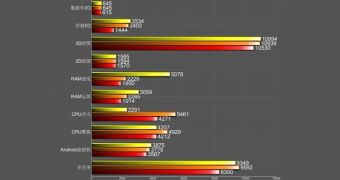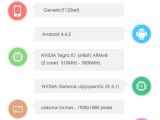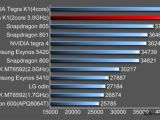The ARM architecture, ARMv8, may have gained 64-bit support a while ago, but NVIDIA's Tegra line of SoCs didn't get there quite as fast. It's finally done it though, more or less, even though the company hasn't actually made it official.
Well, technically. NVIDIA did promise that the next Tegra K1 system-on-chip device would have 64-bit instruction set, but no follow-up release was made.
Still, the dual-core Tegra K1 with 64-bit support is ever closer, every day, and while the Santa Clara, California-based company hasn't released it yet, there are other ways to learn about what we can expect.
Other ways like a leaked AnTuTu Benchmark that shows the chip scoring very well compared to the competition.
And by competition we mean not only the Qualcomm Snapdragon 800, but also NVIDIA's own Tegra K1 quad-core Cortes-A15 SoC (system-on-chip).
It did better, by a fair bit, which is both expected and surprising. Expected because this is a 64-bit architecture compared to a 32-bit processor. Surprising because the 64-bit Tegra k1 SoC has only 2 cores, not four.
At any rate, the chip, Project Denver as it is otherwise known, scores 43,851 points, a sum which is almost 10,000 ahead of the Snapdragon 800, and 7,000 and 6,000 points ahead of Snapdragon 801 and 805, respectively.
The lead over the CES 2014-demonstrated 32-bit Tegra K1 quad-core prototype SoC was of 200 points, but in the comparison to the “real” K1 found in the TegraNote-P1761 tablet, the advantage of Denver is of 5,000 or so.
The tests where Denver seems to falter are those that show CPU floating point and CPU integer performance, but this can be explained by the use of 2 cores instead of 4.
The RAM test, meanwhile, left everything in the dust, and you can be sure that multitasking will be better on tablets than ever before.
As for the actual specs, they are still vague, but the benchmark shows the top clock speed of the CPU cores being of 3 GHz, not the max 2.5 GHz that everyone expected.
Sadly, NVIDIA will only release the chip in a few months, and tablets based on Tegra K1 Project Denver will be available only in the second quarter of 2014. Chances are that the final SoC will be even more powerful than this benchmark says, and conversely it can turn out the other way around, with a weaker chip. The former is more likely though.

 14 DAY TRIAL //
14 DAY TRIAL // 

